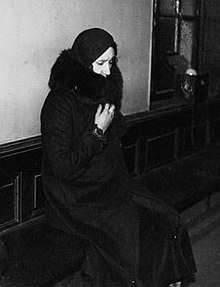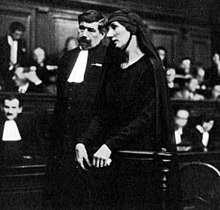Violette Nozière (murderer)
Violette Nozière (11 January 1915 – 26 November 1966) was a French woman who was convicted of murdering her father. The 1978 film of the same name, was based on this case.[1]
Violette Nozière | |
|---|---|
 | |
| Born | 11 January 1915 |
| Died | 26 November 1966 (aged 51) |
| Nationality | France |
| Known for | murdering her father |
Life
Nozière was a bright child who gradually became more wayward. As a young woman she was indulged by her parents and she led a life subsidised by occasional prostitution. As a result, she contracted syphilis and when she became ill her doctor felt obliged to tell her parents. Nozière persuaded a doctor to certify that she was still a virgin in order to persuade her parents that her disease was hereditary. Her parents believed this and Nozière continued to subsidise her life style.
When she was eighteen she persuaded her parents to take poison explaining that it was medicine that has been given to them by the doctor to fix the family's syphilis. Noziere then went out for the evening and when she returned to the flat she found her parents inert bodies. She turned on the gas and when the smell was overpowering she went to a nearby flat where she said that she thought that her parents had tried to commit suicide.[2]

Her father, Jean-Baptiste, who had been an engine driver, died: but his wife, Germaine, recovered. The murder case and Noziere's lifestyle was the main story in the newspapers. The following year she was convicted and sentenced to death but the sentence was gradually reduced, first to hard labour for life in 1934, then to 12 years in 1942. She was released in 1945.[3]
Legacy
The case remained important in French culture.[3] In 1978 a film of the same name, was made that was based on this case.[1]
References
- "Life for Violette". Time. January 7, 1935. Retrieved 2010-09-28.
- Sarah Maza (12 June 2012). Violette Nozière: A Story of Murder in 1930s Paris. Univ of California Press. ISBN 978-0-520-27272-9.
- Sian Reynolds (1 November 2002). France Between the Wars: Gender and Politics. Routledge. pp. 63–. ISBN 978-1-134-79831-5.